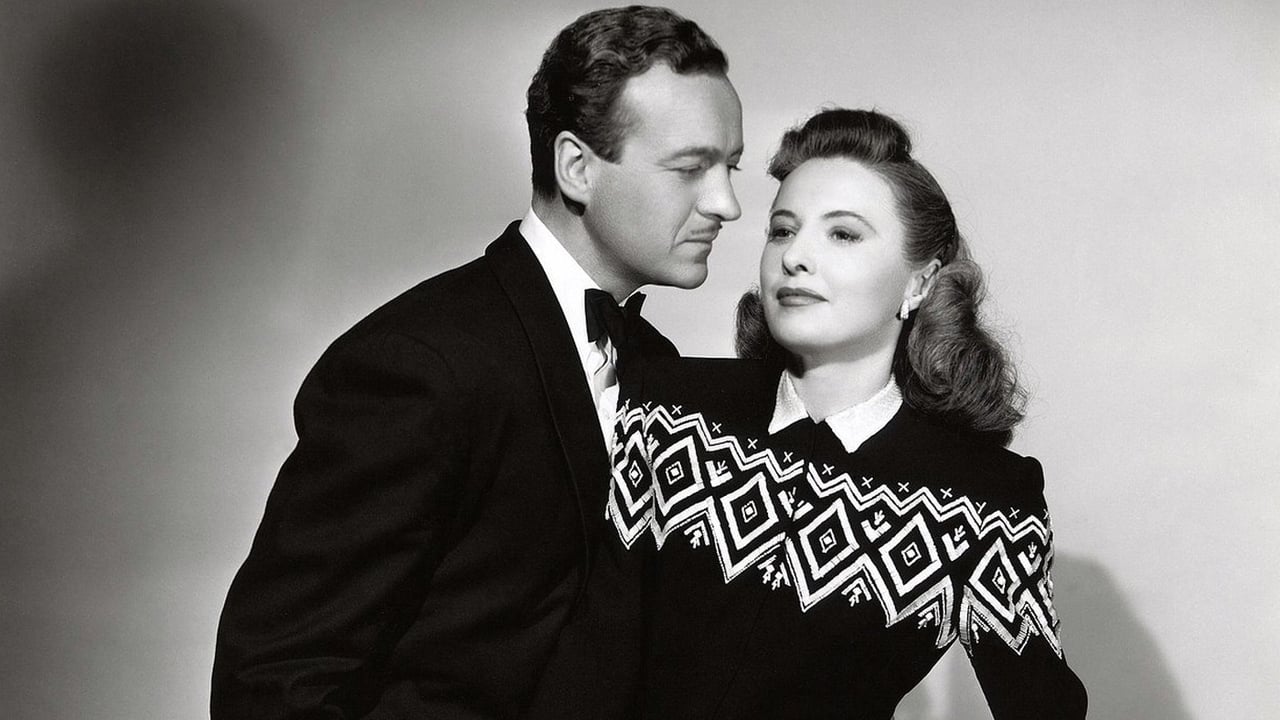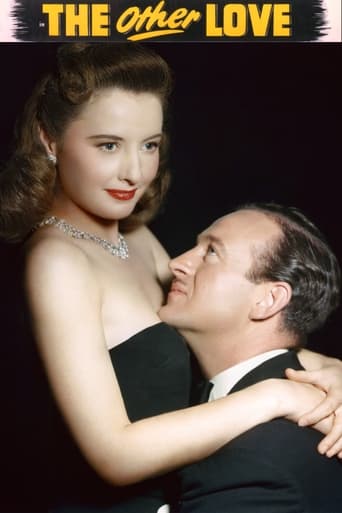

Barbara Stanwyck stars as Karen, a famous concert pianist, who is sent to a picturesque Swiss sanitarium for a lengthy stay. She's suffering from TB and the prognosis isn't good, but her doctor (David Niven) takes a special interest in her case. Karen tires of endless bed rest, however, and falls for a smooth-talking race car driver (Richard Conte).This is a wonderful movie, very much a product of its time. Glamour is everything, as the sanitarium guests dine in gowns and tuxedos while taking long, smoldering drags on their cigarettes. Stanwyck's wardrobe was designed by Edith Head and she looks gorgeous. Niven is a dreamy doctor while Conte is a bit off-putting as the driver on the make.It's all very pretty and Stanwyck only coughs when the music swells, very Camille-like. It's obvious that they completely changed the ending, but that's a minor quibble with such a sumptuous, romantic story as this. Recommended if you like movies the way they used to be.
... View MoreI've always liked Barbara Stanwyck. She's one of a handful of actresses who could make a film even if it was ordinary. This is not one of those films.A concert Pianist heads to a Sanitarium for a stay to convalesce. She's told very little about why she's gotta be there but she acquiesces and stays. The doctor continually averts her attention from her condition to the "things are gonna be alright" type of philosophy. Over time she gets bored staying there and questions why he never tells her the results of his tests on her so she decides to go out into the local town. She meets a race car driver whom she likes and decides she's had enough of the Sanitarium and goes with the race car driver...but not for very long.This was one of those films that never ends up telling you what she has but it's pretty clear by the X-rays she gets and a few comments in the film that she's suffering from an advanced state of Tuberculosis and will not recover. The Sanitarium is just a place to go to die basically. Back In the day when this was rampant these places were rife with this illness. Among all this she falls in love with the Race Car Driver and the Doctor. You basically deal with a woman who's dying and she doesn't realize it. It's good for a decent cry but Stanwyck has done better. It's not bad In any way but it's a pretty generic drama of it's day. It doesn't stand out amongst others of the time. Decent cast with an ordinary story means you should decide for yourself. I liked it for what it was but this isn't a Stanwyck film I would hang my hat on.
... View MoreDuring the 1940's, Barbara Stanwyck was either suffering or making some man suffer in his quest for sin. This is the former, a tearjerker where she plays a concert pianist who discovers she has a fatal disease yet refuses to give up her life. A rarely seen film that for some reason has become her most obscure 40's film (not even given clips in tributes to her or documentaries), "The Other Love" is an elegant film that is worthy of re- discovery. She has two great leading men here-David Niven as her very loyal doctor and Richard Conte as the dangerous race car driver who distracts her from her treatment. A lush musical score (which makes it seem like one of Ross Hunter's later tearjerkers), and a fine supporting cast, including Natalie Schafer, Gilbert Roland and Joan Lorring. I was lucky enough to catch this years ago on the late show in L.A. before the advent of cable, the old version of AMC and TCM which I have never seen this run on. From what I had recalled of the film, it was beautifully photographed with lush sets in exotic places, and is a shot above the average melodrama. Time for this to be re-discovered in tribute to its magnificent leading lady.Recently released on DVD through Olive Films, I was delighted to discover how marvelous it still was and how likable Missy was in it. Still gorgeous, she is like no other leading lady and seems much ahead of her time. She wears some particularly stunning outfits including a sequined sweater that is to die for, pardon the pun, considering the plot. Joan Lorring particularly stands out in the supporting cast as another patient who is rather tragic. Niven's nobility and Conte's fun- loving scoundrel give Stanwck a lot of different moods to play off of, and she does so most admirably. Maybe now that this has been released commercially, it will receive the attention it has long deserved.
... View MoreI was actually pretty much impressed by this story -- with its clever prefiguring, scenes of idyllic beauty, happiness, and jarring chills as abrupt as any horror movie, its music and raging against the dying of the light -- right up until it hits the last few scenes, which somehow strike a false note. Perhaps it's because my sympathies have a tendency, whether in sob-stories like this or in fluff as light-hearted as 'An American in Paris', to veer towards those third parties whose own affections serve only as a momentary derailment to the course of True Love. Perhaps it's my own experience of watching such illness play out its rapacious course, and knowledge of the futile health myths of the era. But after the touch of ice that runs through the rest of the film, the grand finale strikes me as a cop-out.From a medical point of view it does occur to me to wonder how many modern viewers will realise from the start what's supposed to be going on! The dread opening words 'Swiss sanitarium' are no longer a universally-recognised shorthand for the unnamed spectre of tuberculosis, the cancer equivalent for sentimental sagas of the era. But it is, of course, tuberculosis requiring all those chest X-rays, mountain air, and 'stimulating diet'...The story is skilfully constructed along the lines of a murder-mystery, lulling the viewer into security for long stretches of time, arousing sympathy and indignacy at a regime that can deprive Karen of her music as well as her liberty and her mobility. Celestine's constant light malice on the subject of Dr Tony -- jealousy or realistic view? -- stirs up additional doubt, and her role turns out to have a much greater significance than we were led to believe. Questions of truth or lies run like a twisting theme throughout the greater part of the film, keeping the audience off-balance, and making Karen's ultimate reaction of discovery easier to comprehend. (Again, though, I do wonder if modern viewers will realise that in medicine of the period, deceiving patients for their own good was no misdemeanour but more or less expected!)By and large, I found this film much more sophisticated than one might expect from a genre piece of this nature. I've already mentioned the elements that verge unexpectedly on horror amid the sweetness, and the innocent establishment beforehand of items that will later prove significant. Celestine is not what she may appear. And Clermont, too, is not the opportunistic cad first appearances might lead us to assume.My main problem is that it seems to turn a corner into a quite different sort of film in the last few minutes, for no very convincing reason. Given its previous record in this line, I was anticipating some kind of apocalyptic revelation right up until the final shot... and was left still hanging there, waiting, when the film proved merely to have ended. It felt like a simplistic resolution to what had previously proved a complex structure. And, I think, it turns the story into one about the heroine learning her lesson rather than one about her fierce passion for life -- and thus, for me, making her a less appealing character. Despite everything, the cruise might have been the better option...
... View More